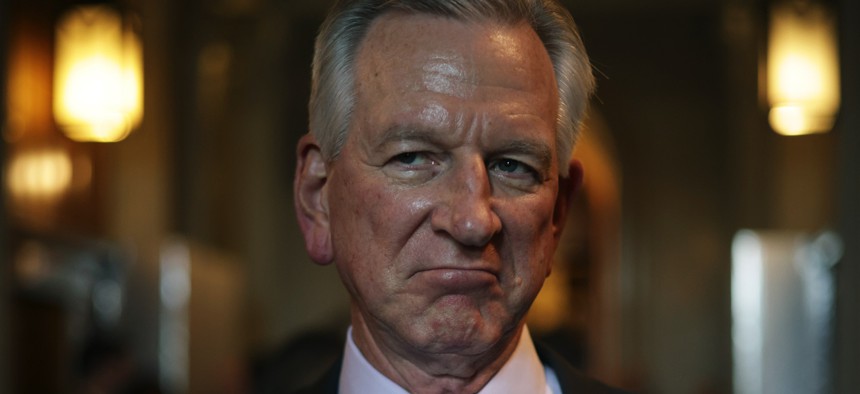
U.S. Sen. Tommy Tuberville (R-AL) speaks to members of the press at the U.S. Capitol on November 15, 2023, in Washington, D.C. Alex Wong/Getty Images
Tuberville says he'll drop his hold on most military promotions
Alabama senator says he will keep the brakes on some of the most senior officers’ nominations.
Updated: 2:45 p.m.
Sen. Tommy Tuberville announced he will release some of his holds on military promotions, mostly ending his months-long protest against the Pentagon’s abortion-access policy.
The Alabama Republican told reporters Tuesday he will continue his hold on four-star nominations.
Since Tuberville levied his blanket hold on senior military promotions in February, nearly 400 senior military officers have seen their advancements delayed. Many have been unable to move on their next assigned post, leaving the military shorthanded in leadership positions around the globe. The senator's partial lift comes after months of warnings by military leaders that his actions were reducing readiness and hurting military families, and of growing frustration from his Republican colleagues.
The GOP senator placed his hold about eight months after the Supreme Court eliminated U.S. women’s right to an abortion. Within weeks of the court’s July 2022 decision, several states had moved to limit access to reproductive health care, including ones that were home to nearly a quarter-million troops, including some 40 percent of female servicemembers. By November, DOD leaders had evidence that the new abortion restrictions were hurting recruiting and retention. They instituted several measures to preserve troops’ access to reproductive care, including paying for transportation out of states that have functionally outlawed abortion.
In February, Tuberville declared that he would take action to press the Pentagon to end this policy: he imposed a “senatorial hold” on every military promotion and defense appointment that requires Senate approval. By mid-year, Tuberville’s hold had delayed several hundred promotions—and left the Marine Corps without a confirmed commandant for the first time in more than a century. Within weeks, the Army, Navy, and Air Force were also without confirmed leaders.
Though Gen. Eric Smith was confirmed as commandant of the Marine Corps in September, the nominee to fill his previous job as assistant commandant was not approved at that time. Smith was performing both of the two top jobs in the Marine Corps when he had a heart attack in late October.
After Smith’s hospitalization, Congress confirmed Adm. Lisa Franchetti to lead the Navy, Gen. David Allvin to lead the Air Force, and Lt. Gen. Christopher Mahoney to add a star to his uniform and take over the job of assistant commandant. Gen. Randy George had been confirmed as chief of the Army in September when Smith was made official commandant.
Jennifer Hlad contributed to this report.






